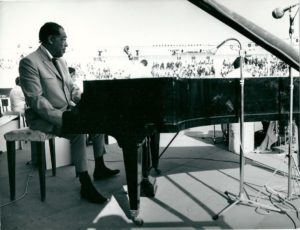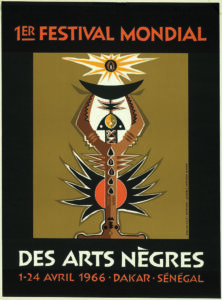
Duke Ellington performing in Senegal. (David Murphy)
A new exhibit in a Paris museum reminds visitors of a time when Black artists were attracted to Africa for a festival that celebrated Black culture.
According to The Conversation, an exhibit at Quai Branly Museum in Paris is showcasing Dakar 66, the first World Festival of Black Arts. The festival was organized by Leopold Senghor, Senegal’s first president. While studying in Paris, Senghor became an advocate of the Negritude movement, which celebrated Black culture.
The World Festival of Black Arts was a celebration of Black culture by Africans and Black people in the Diaspora. Other festivals were later held in Algiers in 1969 and Lagos, Nigeria in 1977.
Senghor believed that all Black people shared a common culture.
“Senghor’s conception of Negritude holds that one’s inner and outer essence is informed, defined by one’s race,” according to an article by A.R. Duckworth in The Journal of Film, Art and Aesthetics. “… Senghor’s conception of race asserts that a person from Ghana, Senegal and Liberia are all biologically African – and therefore share the same African essence.”
Senghor admired artists from the Harlem Renaissance, and so he was eager to have Americans participate in the festival. The Conversation said jazz great Duke Ellington was one of the American artists invited to perform at the festival. He was excited to perform in the motherland.
“The cats in the bleachers really dig it … it gives us a once-in-a-lifetime feeling of having broken through to our brothers,” said Ellington.

Festival poster by Senegalese artist Ibrahima Diouf. (Quai Branly)
However, Ellington’s appearance at the Black Arts festival was controversial. According to The Conversation, some younger militant activists saw him as part of the conservative, old guard. Ellington’s orchestra was funded by the State Department who saw them as cultural ambassadors. This was problematic, too. Ellington was touring the world promoting American culture, while at the time the nation was in the middle of the Civil Rights struggle.
The Conversation said the Black Arts Festival also became a political battleground for the Cold War, with the United States and the Soviet Union jockeying for influence. The United States government saw Senghor, who was more moderate than more radical post-war African leaders such as Patrice Lumumba, as a potential ally. However, the Soviet Union also tried to exert its influence. They sent poet Yevgeny Yevtushenko, who hooked up with Langston Hughes. They spent their time cruising around in a limousine and getting drunk. According to a New York Times writer, the Soviets also tried to say they were better than the United States by bragging about how they never engaged in the slave trade.


